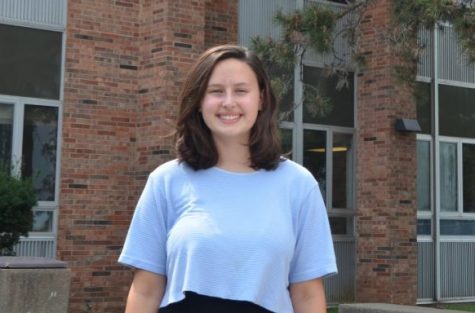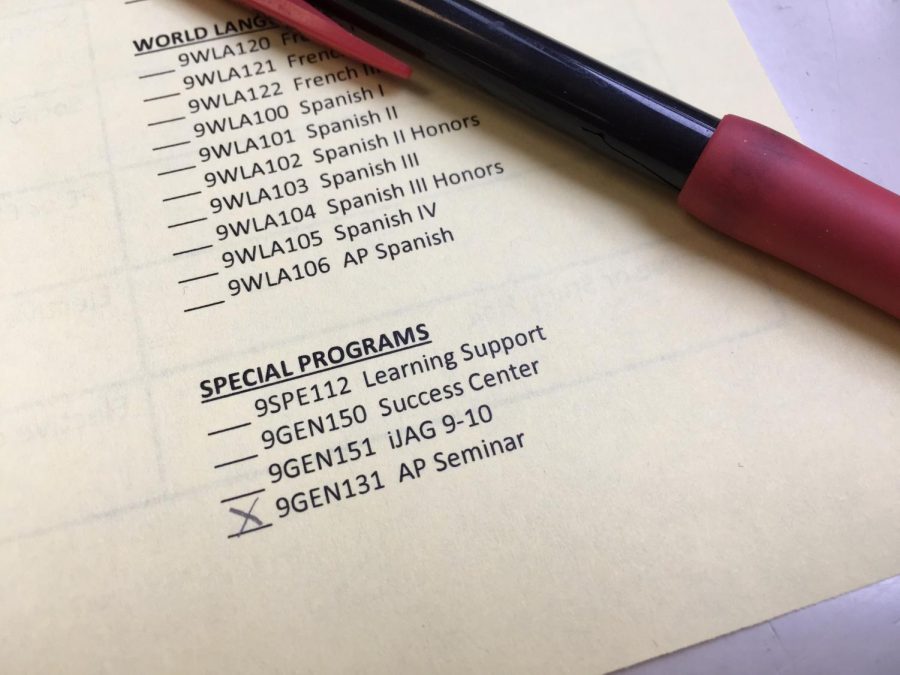New AP opportunity
AP Seminar will be taught for the first time at West in the 2018-2019 school year by Dominic Iannone.
For many high school students, ‘What are your plans for college?’ is a question they face at every family event, block party or dinner with a relative over age 30. Some students are more sure of their futures than others, but even for those who have filled their schedule with AP classes, there is a culture shock the first time they sit in a college classroom.
“They’ve learned a lot of content but they have not necessarily learned the skills that will allow them to be successful in a college classroom,” said social studies teacher Dominic Iannone.
In order to build those skills, West is adding AP Seminar to their range of AP course options, which will be taught by Iannone.
“Seminar doesn’t have a set curriculum unlike almost any other AP [class] imaginable,” said Iannone. “There’s nobody of content, there’s no textbook. There’s a set of skills.”
Teachers are provided concepts to study, such as liberty or utopia, or specific topics, like the issue of dying languages. Students will also be able to discuss and research current events. The students and Iannone will have the most influence over how the class is structured.
Although this year Iannone spends most of his time teaching AP Euro, AP Seminar will be a new experience for Iannone because there is a big difference in how the two classes are structured.
“I think it’s going to be really fun to have the flexibility of the curriculum,” said Iannone. “… I don’t really get to pick the curriculum at all in AP Euro because there’s so much to be covered.”
Educators teaching AP courses are usually suggested to go through training, but it is not required. For AP seminar teachers the training is required, and Iannone will be attending training in Florida for a week over the summer.
It is expected that most of the AP Seminar students will be juniors, with some sophomores and seniors mixed in. The only prerequisite for the class is that students must have completed one AP class before taking AP Seminar.
There is some uncertainty about the new course, especially since the class plan is flexible and the topics are broad.
“[I’m nervous for] its layout because it’s layout is really abstract,” said Abdul-Wahab Mohammad ’20. “There’s no start to end and it could change a lot.”
Iannone is anticipating the first few weeks will be difficult because a class schedule will have to be developed and the materials will need to be planned.
“The biggest fear for me is that during those first two months, let’s say the first couple weeks, are kind of chaotic as we’re figuring it all out,” Iannone said, “and then five of the thirty [students] drop and then tell everybody not to take it next year. So I have to make sure we open really strong.”
For the 2019-2020 school year, West is planning on adding AP Research, a class that requires AP Seminar as a prerequisite. Students that take AP Research and AP Seminar can receive an AP capstone, and if they take four other AP classes they can receive an AP diploma.
AP Seminar is an elective, so the topics range from science and environment to culture and art to economics and politics. Content from any AP class can be applied to Seminar, so the teacher could be from any department.
The chance to have Iannone as a teacher again is what drew some students to the class.
Lukas Anson ’19 took AP Euro as a sophomore and heard about Seminar through the Robotics club that Iannone coaches.
“I really don’t even know what the class is about. I just want to take a class with Iannone again because he’s such a great AP Euro teacher,” said Anson.
“I just love him so much in AP Euro and [how] he was describing it, how it’s more just like skill-based, not really like content…seemed interesting and useful. And I love his teaching style,” said Chloe Gretter ’20.
Students were also motivated to sign up to prepare for college and get the AP capstone and diploma.
“I’m hoping to just develop the skills like thesis writing and LEQ’s, but get really, really good at them so then when I go to college it won’t hopefully be as big of a transition,” Gretter said.
Students are expected to engage in discussions about real-world issues, conduct college-level research and give presentations both in groups and individually. Two-thirds of the AP test score at the end of the year is based on work Iannone grades throughout the year.
“My hope is that it’s going to be fun and engaging [because] the success of it going forward, like future enrollment, is going to depend on word of mouth from people that are taking it next year,” said Iannone. “I want to make sure that it is a good experience and that they feel like they’re getting a lot out of it so they encourage underclassmen to register for it in the future and then hopefully we can grow it as a program.”
Your donation will support the student journalists of West High School. Your contribution will allow us to purchase Scholarship Yearbooks, newsroom equipment and cover our annual website hosting costs.

Natalie Dunlap is a senior and the Online Editor-in-Chief for the West Side Story. She is also involved in theatre and West High Democrats. When she's...




